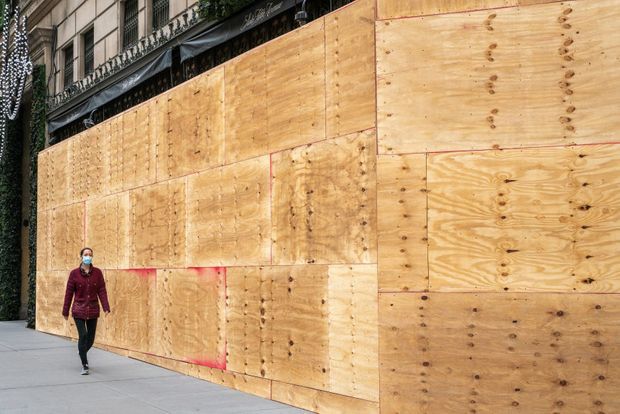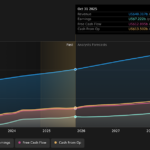
A person walks by a boarded up Saks Fifth Avenue in New York City. As some businesses boarded up store fronts ahead of potential unrest related to the Nov. 3 election, some Americans are doing their own preparation in anticipation of post-election chaos.
David Dee Delgado / Getty Images
For Maine resident Laura Hunter, preparing for Election Day didn’t involve making a voting plan. She voted two weeks early.
Instead, to get ready for Nov. 3, she’s preparing for what some Americans see as a worst-case scenario: Widespread civil unrest or violence following Tuesday’s presidential election. For about a month now, Hunter, who voted for Democrat Joe Biden, has built up supplies of food and cash. She even purchased a butane-fueled stove in the event that the electricity goes out.
“I have what I thought I need for a week or so,” Hunter, 65, said.
In Arlington, Va., Maresa Ciaravella, a 30-year-old mother of one, has made sure both her and her husband’s cars have full tanks of gas should they need to evacuate on a moment’s notice.
Both Ciaravella and her husband are working remotely because of the pandemic. They each have extensive home-office set-ups, and their son attends daycare. All of that made it unfeasible to leave for somewhere that might feel safer ahead of the election, Ciaravella said.
“We are not sure where we would go or even what would be our ‘breaking point,’ but we at least wanted to be prepared with the option to leave,” Ciaravella said. “This year has shown that anything is possible and nothing is off the table, so being prepared for anything has become really important to us.”
Ciaravella, who said she could not disclose who she’s voting for because of her job, said some of her concerns stemmed from witnessing other recent protests, including those related to the Black Lives Matter movement and the push for reopening businesses in Virginia and Maryland amid the coronavirus pandemic.
“My son’s safety is my first priority and I never would have thought that a presidential election would cause me to fear for his safety,” she said. “That probably just highlights my own privilege, but it’s true.”
Hunter, on the other hand, pointed to recent rhetoric from President Donald Trump as the source of her concern, arguing that the president was looking to “whip up all of his supporters into a frenzy.”
Americans are anxious about possible election-related violence
Concerns about election violence appear to be widespread — at least according to one poll. A YouGov survey of 1,500 Americans released in early October found that more than half of respondents expected to see violence because of the election. Republicans were slightly more likely than Democrats to say they expected an uptick in violence.
Other research has shown that the percentage of Americans who believe that violence could be justified to advance their parties’ goals has increased among both Democrats and Republicans.
Mark R. Roberts, a Pennsylvania resident who voted by mail for Trump, says he’s been collecting bottled water, canned goods, and “as much silver as I can.” He’s not stockpiling cash because he thinks paper money would be worthless in extreme circumstances. He’s also been looking for survival food kits, but hasn’t had luck finding any.
“Honestly if Joe Biden would win, I believe we’d see a massive breakdown in society’s ability to provide basic essentials for starters,” Roberts told MarketWatch. “You don’t make a nation wealthy by taxing its citizens.”
Some banks are closing branch locations to prepare for possible unrest
Some Americans may be taking their cues to prepare for potential protests and unrest from major corporations and local institutions. In Washington, D.C., colleges including George Washington University, have warned students and faculty to prepare for potential protests by having food and other necessities stored in their dorm rooms or homes.
The university was following the city government’s lead, which asked area businesses to “prepare for a very active election season,” said Crystal Nosal, assistant director of media relations at George Washington University. She noted that the university has sent similar messages ahead of events including the Fourth of July, past presidential inaugurations and the Women’s March.
“Our goal is to help our campus community plan ahead for any potential disruption that may happen during the election period,” Nosal said.
Meanwhile, Walmart WMT, +1.18% changed course and returned ammunition and firearms to store displays after removing the items late last week “after civil unrest,” the company said. The products in question were still available for purchase, but weren’t being openly displayed.
Banks are considering closing branches across the country. Chase Bank JPM, +2.25% plans to monitor the public’s response to the election and is “prepared to close branches if necessary,” said Amy Bonitatibus, Chase’s chief communications officer. Truist TFC, +3.22%, which was formed last year from the merger of SunTrust and BB&T, has closed a few of its more than 2,000 bank branches “out of an abundance of caution” in areas where other nearby businesses are temporarily shuttered, said Cynthia Montgomery, Truist’s director of communications for the retail community bank division.
A Wells Fargo WFC, +2.09% spokeswoman said that the bank has boarded windows of “a small number of branch locations in select cities,” but these branches are remaining open for business unless they were already closed because of the pandemic.
‘It’s not a natural disaster. It’s an election.’
Michelle Sawicki, a Biden supporter who lives in Las Vegas, said that she had the idea of gathering supplies ahead of the election in the back of her mind for a while. But she was inspired to take action after she saw some local businesses board up their windows and spoke with clerks at her local grocery store who had performed active-shooter drills specifically in preparation for the election.
“It’s just very weird to be living someplace that is taking precautions as if we were on track for a hurricane or some sort of natural disaster,” Sawicki, 53, said. “It’s not a natural disaster. It’s an election in a first world nation that is a democracy.”
Adding to Sawicki’s concern is the fact that she’s only lived in Las Vegas for about a year and has not seen what happens normally during an election in Nevada. She also expressed concern about whether she could rely on police if she were in a risky situation.
“I’m seeing many police unions that are supporting Donald Trump, and I am concerned that because I’m the on the left of things that the police are not at my disposal,” she said. So far, Sawicki said, she has collected enough cash, gas, food and prescription medications to last her around two weeks.
What financial planners say about how to prepare your finances
While election-related anxiety may be prompting some people to prepare for the worst, financial experts have cautioned that Americans shouldn’t take any steps to alter their long-term financial plans simply because of the election.
“Long-term investment decisions should not be based on short-term events and emotions,” said Gage Paul, a certified financial planner with Western Reserve Capital Management in Hudson, Ohio.
For those who are worried about how others will respond to the election’s outcome, Paul suggested either stocking up on food or water as if an extreme weather event were on the horizon, or, for those who can afford it, considering relocating to a vacation home for a few days.
And if people are concerned about the possibility of property damage, they may want to consider having a financial go-bag at the ready, including photos of their home or car before the election should they need to file for an insurance claim related to any hypothetical incident that could occur.
Leslie Albrecht contributed to this story.










